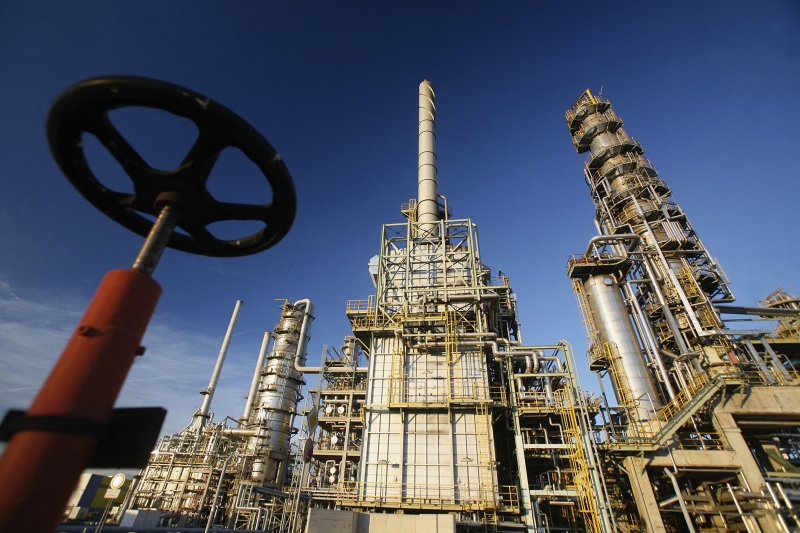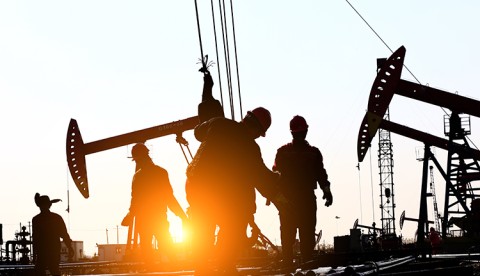At Amuay, this oil-rich country’s largest refinery, workers say they risk toxic-gas exposure as they wait for Petróleos de Venezuela SA, the state energy giant, to replace rusted pumps and corroded pipelines, a process that is taking years.
The 4,000 workers have a tough job. Their daily salaries are equivalent to little more than one U.S. dollar due to Venezuela’s collapsing currency. “We’re the lungs of this country’s economy, but they pay us like we’re the lowest of the low,” said Ivan Freites, who heads a union representing workers at Amuay and an adjacent refinery, Cardón, that make up the world’s second-largest refining complex.
The Paraguaná Peninsula has the potential to process a million barrels of oil daily. But PDVSA is hobbled by serious cash-flow problems, chronic shortages of replacement parts and frequent mishaps that often keep production close to 50% of capacity, union leaders say. In addition, the refinery struggles with rolling blackouts and shortages of products like motor lubricants, which are made here.
There’s also the risk of worker injury. Forty people died in an unexplained blast at Amuay in 2012. Data for the refinery isn’t publicly available, but the oil ministry’s 2014 report shows Venezuela registered 5.32 injuries per one million work hours, compared with an industry average of 0.45 logged by the London-based International Association of Oil and Gas Producers.
The troubles here have made this impoverished oil town emblematic of the Venezuelan petroleum industry’s unfulfilled promises. An oil bonanza supported the country’s Socialist government for more than a decade, but residents now wonder where the money has gone.
After working for PDVSA for nearly two decades, 52-year-old José Rodríguez’s last job as a maintenance contractor at Amuay ended two years ago. He started driving a taxi, earning several times more money. “Working in the refinery wasn’t worth the risk,” said Mr. Rodríguez, who has chemical burns on his hands and arms from his work at PDVSA.
But Venezuela’s triple-digit inflation and car-part shortages derailed Mr. Rodríguez’s plan B. Unable to buy or find spare parts, he retired his old jalopy earlier this year. A friend now lends him a boat to fish. “It’s what I have to do so we can eat.” Mr. Rodríguez explained.
Fishing in the shadow of Amuay also has risks, though. In late October, a refinery pipeline exploded, sending oil into the waters of the adjacent bay and threatening some 20 miles of coast line, plus the livelihoods of some 500 fishermen. The spill was soon cleaned up, but it left residents bitter.
“I would say PDVSA has been more of a curse for this community than a blessing,” said Esteban Sánchez, a 69-year-old environmental activist. “Here we are trying to make a living by doing something not related to the oil business, and PDVSA ruins it.” PDVSA officials didn’t respond to requests for comment on complaints from residents and workers.
The October spill was the start of a calamitous series of events for Amuay as power failures and technical problems reduced its capacity to produce essentials like gasoline. “It was like watching dominos fall,” recalled Mr. Freites.
As accidents and power outages mounted in late 2014, Venezuela purchased nearly 1.3 million barrels of gasoline from the U.S., the most since the deadly gas-leak blast at Amuay three years ago, U.S. Energy Information Administration data shows.
In Venezuela’s refining capital, it wasn’t a surprise the country with the world’s largest proven crude reserves was forced to buy fuel from its sworn ideological foe. In interviews, 10 active refinery workers living in Paraguaná described a situation of low morale amid deteriorating working conditions.
In the collective labor contract for its 122,000 employees, PDVSA guaranteed the replacement of security equipment like masks, helmets and boots every three months. It hasn’t happened, said José Bodas, another union leader.
The company also hasn’t renewed its workers’ contracts since the last one expired in October 2013, and it remains in a dispute with workers who say their salaries are supposed to keep up with inflation.
“What’s happening is that many of the experienced professionals are leaving or seeking early retirement,” said Mr. Freites, “and the company is filling their spots with people with very little experience.”
Source: Wall Street Journal












